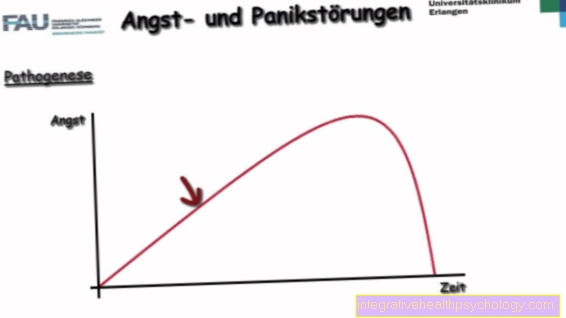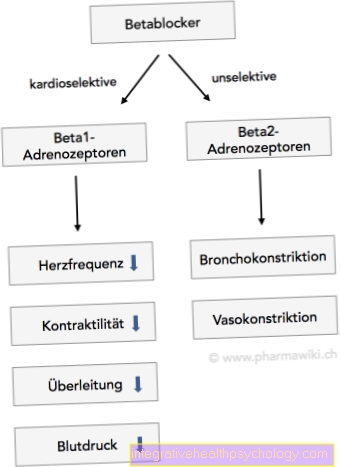Abscess under the tongue
Definition
An abscess under the tongue is an inflammation in the mouth that, in most cases, is caused by bacteria. A small wound is enough for the germs to penetrate the mucous membrane and cause a purulent inflammation. In the case of an abscess under the tongue, a distinction is made between the tongue base abscess and the floor abscess of the mouth. The base of the tongue abscess is the focus of inflammation at the base of the tongue, i.e. at the base of the tongue, whereas an abscess of the base of the mouth is further forward in the mouth.

Most abscesses under the tongue are caused by bacteria. The most common pathogen causing abscesses is staphylococcal bacteria that occur naturally on the skin. The bacteria penetrate the mucous membrane through small wounds in the oral cavity and lead to an infection. The immune system fights the pathogens and inflammation develops. When inflamed tissue and pus melt down, an encapsulated abscess forms in the floor of the mouth.
In addition to sores and small injuries in the mouth area, other inflammations in the head and neck area can cause an abscess under the tongue. Abscesses often form through inflamed tooth roots, where the bacteria spread and attack the surrounding tissue and the jawbone. Other causes are inflamed lymph nodes in the neck area or under the jaw and inflammation of the lower jaw salivary glands. Tongue piercings can also damage the mucous membrane under the tongue and cause an abscess in the floor of the mouth.
diagnosis
If there is pain in the mouth area and an abscess in the oral cavity is suspected, an ENT specialist should be consulted. The diagnosis is made by examining the oral cavity using an endoscope or mirror, which reveals the severe swelling. The doctor can take a smear and identify the bacterial pathogen. In addition, the doctor can take blood and check the levels of inflammation in the body. The diagnosis can be confirmed and the spread of the inflammation in the tissue assessed by means of an ultrasound examination or CT (computed tomography).
Symptoms
- Swelling in the lower jaw and around the muscles of the floor of the mouth
- severe pain in the lower jaw area
- Discomfort when speaking, swallowing and chewing
- Locked jaw: Problems opening the mouth
- Swollen lymph nodes: the supplying lymph nodes in the neck area are usually also severely swollen
- Sensation of warmth in the affected area
- Fever: A high fever is a sign that the bacteria has spread around the body via the blood or lymphatic fluid. This can lead to serious complications, such as blood poisoning or a brain abscess
- Breathing problems: if you have a large abscess, the swelling can be very severe and spread to the point where you have difficulty breathing. In such cases, a doctor must be consulted immediately
Please also read our article on this Abscess in the mouth.
Spread to the lip
An abscess under the tongue can spread and reach the lip. A bacterial inflammation of the lip can be dangerous, as the so-called "Danger Triangle" is located here, which extends from the lip to the nose. Within this area, the venous outflow of blood takes place via veins that lead directly into the brain.
If bacteria from the inflamed tissue get into the bloodstream of the lip, life-threatening complications, such as a brain abscess, can occur.In the case of a brain abscess, brain tissue and nerve cells die irretrievably, which can result in paralysis, sensory disorders and loss of the senses.
Find out more about this here: Abscess on the lip
Spread to the cheek
In the course of an abscess under the tongue, the inflammation can spread to the mouth and destroy the tissue up to the cheek. The cheek on the affected side swells a lot and is reddened. Patients with a so-called abscess cheek have to consult a doctor as quickly as possible, who will surgically open the abscess and completely remove the infected tissue.
You can also find detailed information here: Inflammation of the cheek
therapy
An abscess under the tongue can cause serious complications, so see a doctor immediately at the first sign. The faster the treatment, the faster the healing will occur.
An abscess is caused by bacteria that can be fought with antibiotics. However, since an abscess is an encapsulated inflammation, the medication usually does not penetrate deep enough into the focus of the infection to be able to kill the bacteria. Therefore, drug treatment of an abscess under the tongue is in most cases insufficient.
Read more on the topic: Betaisodona oral antiseptic
Usually an abscess under the tongue needs to be surgically removed. The surgical procedure is carried out through a large incision in the oral cavity, more rarely an additional incision is made from the outside. During the operation, the doctor will remove the inflamed tissue and possibly place a drain through which the accumulated pus can drain away. Usually the wound is not sutured, but heals open. This prevents the infection from developing again and the pathogens from encapsulating themselves in an abscess under the tongue. The operation is followed by high-dose antibiotic therapy for several days to accelerate the healing process and reduce the risk of relapse.
Read more on the topic: Treatment of an abscess
Duration of an abscess under the tongue
The length of time an abscess under the tongue lasts depends on how quickly a diagnosis is made and appropriate treatment is given. Large abscesses that have spread deep into the tissue take more time to heal than small, more harmless inflammations. An abscess rarely heals on its own and usually needs to be surgically removed. After surgery in combination with drug treatment, an abscess under the tongue usually heals easily within a few days (6-14 days).





























